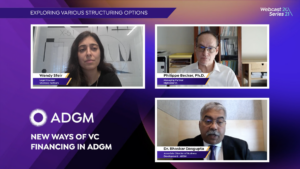The Abu Dhabi Global Market (ADGM) recently held a webinar on the “New ways of VC Financing in ADGM.” The webinar discussed the VC landscape in terms of ADGM’s VC Managers Framework and perspectives from investors.
Dr. Bhaskar Dasgupta, Associate Director of Business Development, ADGM, noted that the financial centre had close to 300 startups, with more to soon enter the pipeline. He also noted that there were over 110 firms at Hub71, a startup ecosystem platform in Abu Dhabi, as well.
Moreover, the ADGM was also home to about 20 VC firms, along with angels, PE funds and sovereign wealth funds.
The Financial Services Regulatory Authority (FSRA), which is the ADGM’s regulatory body, decided to take a second look at its regulatory regime for VC managers and funds last year, due to a rapidly evolving global startup landscape.
ADGM makes changes to VC managers framework
Naomi Jacob, a senior specialist at ADGM, noted that the FSRA had first introduced a VC Managers Framework in 2017.
Under the framework, VC managers would not be subject to any base capital requirements or expenditure based capital.
With feedback from the VC industry, the framework was revamped this year to keep pace with market developments, Jacob said. The FSRA introduced two key changes as highlighted by Jacob.
These were:
– The definition of VC funds has been widened to let funds invest more broadly outside equity, (meaning into venture debt instruments which are classified as securities by the FSRA).
Moreover, the broadened definition of VC funds also allows them to now be set up as feeder funds subject to conditions, and for non-retail foreign funds to qualify. VC funds could previously only be set up as domestic, exempt or qualified investor funds.
– VC managers can now advise or arrange co-investment deals alongside the fund they manage. These activities will need to be added to the manager’s FSP (financial services permission). No additional regulatory fees would be required for this, and managers will be made exempt from additional capital requirements.
VCs discuss the new framework

L-R Wendy Sfeir (Shorooq Partners), Philippe Becker (Highwater VC), Bhaskar Dasgupta (ADGM). Source: ADGM
In a Q&A session moderated by Dasgupta, Wendy Sfeir (Shorooq Partners) and Philippe Becker (Highwater VC) discussed the new rules by the ADGM.
Sfeir noted that the co-investment rules were “extremely powerful”, and will help to assist startups by connecting them to the entire VC network at funds. It also improved the scope of fundraising efforts, with startups now having access to more funding instruments as well.
Further, Sfeir added that the changes made the ADGM more attractive as a jurisdiction. Having more non-dilutive tools without having to go to another jurisdiction improves the relevance of ADGM.
Separately, Shorooq Partners may be opening a Dubai office towards the end of the year, Sfeir said.
Becker explained that access to flexible capital was one of the components that made Silicon Valley successful. Debt-equity hybrids were important to match the stage and sector that startups are at, he said, and startups can tend to prefer convertible debt to leave valuation for later as a strategic move.
Amidst all this, venture debt also made funding agile for startups, helping them to hit the ground running because they’re not tied back by funding discussions.
Moreover, co-investing opportunities could help to increase investor’s exposure since fundraising amounts are not restricted entirely to the funding vehicle. This helps funds improve their service to investors as well.
Dasgupta also commented that these changes came amidst a bubbling interest in emerging financing opportunities, such as tokenised VC funds and carbon credits. The culture for risk-taking has also changed, and family offices are diversifying away from real estate into startups, he said.
Becker shared this thought, noting that there has been a “remarkable” change in attitude and a generational shift towards startups, tech and regulatory regimes in the past 10 years in the UAE.
Featured image credit: ADGM








1 Comment so far
Jump into a conversation